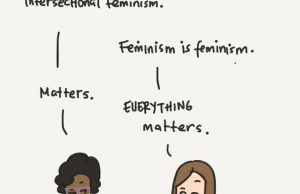Elite Women Won’t Help Us All Have it All
By Nikol Alexander-Floyd, Michele Tracy Berger, and Julia Jordan-Zachery
 Anne-Marie Slaughter is right! Women can’t have it all, particularly not if our hope for having it all is vested in elite (white) women, and our definition of having it all is limited to climbing corporate and government ladders, while raising our own families.
Anne-Marie Slaughter is right! Women can’t have it all, particularly not if our hope for having it all is vested in elite (white) women, and our definition of having it all is limited to climbing corporate and government ladders, while raising our own families.
In her article, “Women Still Can’t Have It All,” (Atlantic Monthly) Anne-Marie Slaughter deeply questions a long held liberal feminist ideal that women can have families and pursue careers with equal success. In discussing her and her colleagues’ dissatisfying herculean juggling efforts, she risks provoking the ire of generations of women who paved the way for her success in order to prescribe a different model for younger women. Others critique the demographic limitations of Slaughter’s analysis. She speaks for a narrow slice of women workers–elite professionals–but ignores that there are race and class differences even among professional women. But, as Black feminists and social scientists, we are especially struck by the faith she places in elite actors as the solution for remedying ongoing structural inequalities. Missing from her analysis is an understanding of race and the need for collective effort and coalition building for social transformation.
Like the early sociologist and public intellectual W.E. B. DuBois, who believed that it would take an educated elite to “lift” the Black masses, Slaughter suggests that conditions will only change for women as a whole when women, like her, are able to occupy the corridors of power. But this easy equation of formal and substantive equality, though popular among some mainstream feminists, is not borne out in reality. White women or racial minorities in power at times succumb to the seduction of business as usual politics, opting for minimal (and often incremental) changes in terms of equity, while leaving underlying resource distribution and structures in place. The challenges working women face are too urgent to wait until racial and gender parity is individually achieved in every executive office in the private and public sectors.
 There is a tension that underlies Slaughter’s argument. While she gives a nod to the efforts of prior generations of women, because she focuses on the efforts of the heroic individual, she ends up ignoring the importance of social movement politics and policy that opened up opportunities for her and later generations. Affirmative action, of which White women are arguably its greatest beneficiaries, has been critical to opening educational and business opportunities. And the workplace changes she celebrates have not only been the result of women pursuing power, but more importantly, also the concerted effort of social and legal activists, which she mentions briefly. Certainly elites play a role, including in social movements, but history shows that mass movement and collective engagement better facilitate social change. Ella Baker demonstrated in her guidance of the Student Non-Violent Coordinating Committee, for instance, the power of decentralized, inclusive leadership. While some celebrate iconic figures, like Martin Luther King, Jr. and Fannie Lou Hamer, it is important to remember that their work for social justice was in concert with communities of engaged citizens.
There is a tension that underlies Slaughter’s argument. While she gives a nod to the efforts of prior generations of women, because she focuses on the efforts of the heroic individual, she ends up ignoring the importance of social movement politics and policy that opened up opportunities for her and later generations. Affirmative action, of which White women are arguably its greatest beneficiaries, has been critical to opening educational and business opportunities. And the workplace changes she celebrates have not only been the result of women pursuing power, but more importantly, also the concerted effort of social and legal activists, which she mentions briefly. Certainly elites play a role, including in social movements, but history shows that mass movement and collective engagement better facilitate social change. Ella Baker demonstrated in her guidance of the Student Non-Violent Coordinating Committee, for instance, the power of decentralized, inclusive leadership. While some celebrate iconic figures, like Martin Luther King, Jr. and Fannie Lou Hamer, it is important to remember that their work for social justice was in concert with communities of engaged citizens.
If indeed we want women to have it all, we must first tackle the issue of what having it all means. We must ask the critical question of who determines the meaning of “all” and whose voices are heard. This would also require that we re-envision a different form of leadership. Consider that the majority of working women are employed in fields that are currently under attack, such as education and other public sector jobs. The modern-day robber barons and the financial industry that have benefitted from government largess through bailouts is now supporting an attack on labor, which centers on many of the economic domains in which women are disproportionately represented. The political project she proposes suggests that once a woman is in power–the ultimate power position as President of the United States–then women, even those working at Walmart, can have it all.
We beg to differ.
As Black feminists critical of traditional feminism have argued, not all women embody the same notion of feminism and indeed simply being born a woman does not necessarily result in one being a feminist. To counter such an attack and pursue equality for diverse groups of women, it is not enough to simply have an equal number of women at the table. We cannot assume that the mere presence of women will result in change–change we can believe in. Instead, we have to engage in a radical feminist project that emboldens all women to fight for substantive change in their everyday lives, and hold politicians accountable. If the history of political change in the U.S. serves us correctly, it will take a concern for and the collective efforts of women workers, like those at Walmart, and not a female president, to get the changes we all desire.
___________________________________________
 Dr. Nikol G. Alexander-Floyd is associate professor of Women’s & Gender Studies at Rutgers University-New Brunswick. A lawyer and political scientist, her interdisciplinary scholarship and teaching integrate the study of politics, law, women’s studies, and Black studies. Two of her most recent publications include “Disappearing Acts: Reclaiming Intersectionality in the Social Sciences in a Post-Black Feminist Era” (Feminist Formations ) and “‘But I Voted for Obama’: Melodrama and Post Civil Rights, Post-Feminist Ideology in Grey’s Anatomy, Crash, and Barack Obama’s 2008 Presidential Campaign” (National Political Science Review). She is also author of the book Gender, Race, and Nationalism in Contemporary Black Politics (Palgrave MacMillan, 2007).
Dr. Nikol G. Alexander-Floyd is associate professor of Women’s & Gender Studies at Rutgers University-New Brunswick. A lawyer and political scientist, her interdisciplinary scholarship and teaching integrate the study of politics, law, women’s studies, and Black studies. Two of her most recent publications include “Disappearing Acts: Reclaiming Intersectionality in the Social Sciences in a Post-Black Feminist Era” (Feminist Formations ) and “‘But I Voted for Obama’: Melodrama and Post Civil Rights, Post-Feminist Ideology in Grey’s Anatomy, Crash, and Barack Obama’s 2008 Presidential Campaign” (National Political Science Review). She is also author of the book Gender, Race, and Nationalism in Contemporary Black Politics (Palgrave MacMillan, 2007).
 Dr. Michele Tracy Berger is associate professor in the Department of Women’s and Gender Studies at the University of North Carolina, Chapel Hill and adjunct professor in the Department of City and Regional Planning. Her books include Workable Sisterhood: The Political Journey of Stigmatized Women with HIV/AIDS (Princeton University Press, 2004) and the co-edited collections Gaining Access: A Practical and Theoretical Guide for Qualitative Researchers (Altamira Press, 2003) and The Intersectional Approach: Transforming the Academy Through Race, Class and Gender (University of North Carolina Press, 2010). Her teaching and research interests include multiracial feminisms, qualitative methods, and HIV/AIDS activism.
Dr. Michele Tracy Berger is associate professor in the Department of Women’s and Gender Studies at the University of North Carolina, Chapel Hill and adjunct professor in the Department of City and Regional Planning. Her books include Workable Sisterhood: The Political Journey of Stigmatized Women with HIV/AIDS (Princeton University Press, 2004) and the co-edited collections Gaining Access: A Practical and Theoretical Guide for Qualitative Researchers (Altamira Press, 2003) and The Intersectional Approach: Transforming the Academy Through Race, Class and Gender (University of North Carolina Press, 2010). Her teaching and research interests include multiracial feminisms, qualitative methods, and HIV/AIDS activism.
 Dr. Julia Jordan-Zachery is an Associate Professor of political science at Providence College, where she also serves as the Director of the Black Studies Program. Her research focuses on African American women and public policy. Dr. Jordan- Zachery has authored a number of articles including: “The Female Bogeyman: Political Implications of Criminalizing Black Women” and “Let Men be Men: A Gendered Analysis of Black Ideological Response to Familial Policies” and she is the author of the award winning book Black Women, Cultural Images and Social Policy (Routledge).
Dr. Julia Jordan-Zachery is an Associate Professor of political science at Providence College, where she also serves as the Director of the Black Studies Program. Her research focuses on African American women and public policy. Dr. Jordan- Zachery has authored a number of articles including: “The Female Bogeyman: Political Implications of Criminalizing Black Women” and “Let Men be Men: A Gendered Analysis of Black Ideological Response to Familial Policies” and she is the author of the award winning book Black Women, Cultural Images and Social Policy (Routledge).




8 Comments